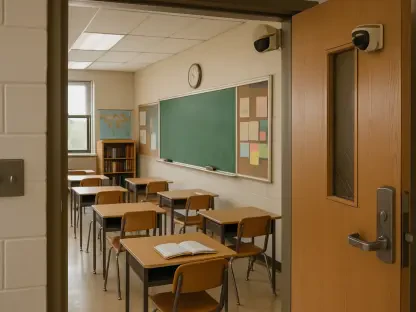As lawmakers reconvene in Raleigh, a renewed call for enhanced public school funding in North Carolina has emerged. This advocacy is led by the Public School Forum of North Carolina, which has outlined a comprehensive plan of priority issues for the 2025-2026 legislative biennium. State Superintendent of Public Instruction, Mo Green, has also emphasized the need for competitive teacher pay, aligning with the Forum’s objectives.
The Need for Equitable and Adequate School Funding
Current Funding Status
North Carolina’s public school funding is currently ranked 48th nationally in per-student spending, adjusted for regional cost differences. This stark positioning places the state significantly behind the national average by nearly $5,000 per student, highlighting a profound gap in resources allocated to students. The disparity underscores a pressing systemic issue that advocates argue directly impacts student outcomes, including lower test scores, reduced graduation rates, and limited future earnings. This underinvestment in education reveals a cycle of inequity in which underfunded schools struggle to provide the same quality of education as their well-funded counterparts.
The state’s ranking of 49th in funding effort further exacerbates the problem, painting a grimmer picture of the commitment to education in North Carolina. Advocacy groups argue that this chronic underfunding is a significant factor in the state’s ongoing struggle to achieve educational standards comparable to those of more adequately funded regions. The current model of funding allocation does not adequately accommodate the diverse needs of students, particularly those from low-income backgrounds, thus perpetuating educational inequities. Without significant changes to the funding model, North Carolina risks leaving a generation of children behind in an increasingly competitive global economy.
Addressing Individual Student Needs
Dr. Lauren Fox, the Forum’s senior director of policy and research, has been vocal about the necessity for a more flexible and efficient funding system to address the varied and complex needs of individual students. Such a reformed system would not only provide more resources overall but also ensure that funds are allocated in a manner that can effectively tackle the diverse challenges faced by students across the state. Dr. Fox stresses that the current flat distribution model fails to recognize the nuanced needs of different student demographics, from those requiring special education services to those in economically disadvantaged areas.
The goal is to move towards a model that recognizes and addresses these individual needs through targeted investments and support structures. By doing so, advocates hope to create an educational environment where every child, regardless of socioeconomic background, has access to quality education and opportunities for success. This approach would involve significant policy changes to how funds are allocated and monitored, ensuring that schools can adapt to the specific requirements of their student populations. Implementing this change is crucial for closing the achievement gap and fostering a more equitable education system statewide.
Competitive Teacher Pay
Current Teacher Compensation
North Carolina currently ranks 42nd nationally for beginning teacher salaries and 38th for average teacher pay. This low compensation for educators starkly contrasts with the salaries of graduates in other professions, who often earn about 25% more. This compensation gap has been a primary factor in the surge of teachers leaving the profession for better-paying jobs, contributing to a critical teacher shortage. The financial challenges faced by teachers, combined with the demanding nature of the job, make it difficult to attract and retain quality educators in the state.
The impact of low teacher compensation extends beyond just the financial well-being of the educators; it directly affects the quality of education students receive. Highly qualified teachers are essential for creating effective learning environments, and when compensation is insufficient, it becomes challenging to recruit and retain such professionals. The persistent exodus of teachers from the profession not only undermines the stability of the educational workforce but also disrupts student learning and academic continuity. Addressing this pay disparity is imperative for building a robust and sustainable teaching force in North Carolina.
Prioritizing Teacher Pay
Superintendent Mo Green stresses that increasing base pay for educators should be a top priority for policymakers. He argues that addressing this issue fundamentally and sustainably is essential for retaining quality teachers and ensuring a high standard of education across the state. Green highlights that, while teachers are the primary focus, it is also important to consider compensation for all educators within the system, including support staff and administrators, to create a comprehensive approach to educational improvement.
Green’s emphasis on holistic compensation reform aims to create a more attractive and sustainable profession for educators, thereby improving overall educational outcomes for students. Advocates argue that substantial and sustained salary increases are necessary to make teaching a competitive and appealing career choice, akin to other professions requiring similar levels of education and expertise. This would not only help in retaining existing teachers but also attract new talent to the field, ultimately leading to a more stable and effective education system in North Carolina.
Supporting Student Well-Being
Holistic Approach to Education
Advocates for equitable school funding emphasize the importance of supporting student well-being both in and outside of school. They argue for a holistic approach to education that considers students’ mental, emotional, and physical health, recognizing that student outcomes are interconnected with broader support systems. This perspective acknowledges that factors such as family environment, community resources, and extracurricular opportunities play crucial roles in shaping a student’s educational journey and overall success.
Implementing a holistic approach involves integrating support services within schools, such as mental health counseling, health services, and nutrition programs, to ensure that students’ diverse needs are met. Additionally, fostering strong connections between schools and community organizations can provide a network of support for students beyond the classroom. These measures aim to create an environment where students can thrive academically and personally, setting the foundation for lifelong success. Advocates argue that such a comprehensive strategy is essential for addressing the root causes of educational disparities and promoting equity within the education system.
Effective Assessment and Accountability Policies
Adopting fair and effective assessment and accountability policies is crucial for fostering a supportive educational environment. These policies should be designed to accurately reflect student progress and provide meaningful feedback to educators, students, and parents. Effective assessment measures would go beyond standardized testing and include diverse evaluation methods, accommodating various learning styles and abilities to paint a more comprehensive picture of student achievement.
Accountability policies should also be equitable, ensuring that all educational institutions, whether public or private, adhere to consistent standards. This involves transparent data reporting, regular evaluations, and mechanisms for addressing underperformance. By implementing robust accountability measures, policymakers can ensure that resources are utilized effectively and that all students receive a high-quality education. Such policies are instrumental in identifying areas of improvement and fostering a culture of continuous growth and development within the educational system.
Accountability for Private Schools Receiving Public Funds
Scrutiny of Private Schools
Private schools that receive public funds have come under scrutiny for their lack of rigorous accountability. Unlike public schools, private institutions benefiting from vouchers are not held to the same standards, with minimal requirements for teacher licensing. This discrepancy raises significant concerns about the quality of education provided and the oversight of these schools. Furthermore, private schools often conduct background checks only for top administrators and are not mandated to follow a specific curriculum or have publicly elected school board oversight, which are standard practices in public schools.
Advocates argue that such lax accountability measures undermine the integrity of the education system and the equitable distribution of public funds. They contend that when public dollars are used to support private institutions, these schools should be subject to the same level of scrutiny and accountability as their public counterparts. This is crucial for ensuring that taxpayer money is used effectively and that all students, irrespective of the type of school they attend, receive a high-quality education.
Calls for Transparency and Consistency
Advocates for public school funding underscore the necessity for transparency and consistency across all educational institutions receiving public funds. State Senator Sydney Batch insists that public dollars must carry accountability regardless of whether they support public or private institutions. Batch’s stance is that without rigorous oversight, there can be no assurance that the funds are being used in ways that genuinely benefit students. This sentiment is echoed by other policymakers who emphasize the need for uniform standards to ensure that all educational institutions are held to the same level of accountability.
Senator Kevin Corbin concurs, emphasizing the need for uniform standards across the board. This push for consistency seeks to create a level playing field where all schools, regardless of their funding sources, are subject to the same rigorous criteria for educational quality and financial transparency. Advocates argue that such measures are essential for fostering trust in the education system and ensuring that all students have access to an equitable and high-quality education. This approach aims to enhance the overall integrity and effectiveness of the state’s educational landscape.
Legislative Challenges and Political Landscape
Historical Resistance from GOP-Led General Assembly
A noteworthy trend identified in the advocacy for equitable school funding is the likely resistance from the GOP-led General Assembly. Historically, this legislative body has favored tax cuts and increased funding for private school vouchers over traditional K-12 public education funding. This ideological divide presents a significant challenge for advocates pushing for enhanced public school investments. The preference for reducing taxes and promoting school choice through vouchers often results in diminished support for increasing public education budgets, complicating efforts to secure the necessary funding for comprehensive school reforms.
This resistance is rooted in a broader political philosophy that prioritizes limited government intervention and increased market competition. Proponents of this approach argue that it leads to greater efficiency and better outcomes. However, critics contend that it exacerbates inequalities and undermines the ability of public schools to meet the needs of all students. Navigating this ideological rift requires advocates to build compelling arguments and forge coalitions across political lines to gain support for their initiatives. The challenge is to demonstrate the long-term benefits of investing in public education for the state’s economic and social well-being.
Navigating Political Hurdles
As lawmakers gather once again in Raleigh, there is a renewed push for increased public school funding in North Carolina. Leading this campaign is the Public School Forum of North Carolina, which has mapped out a detailed set of priority issues for the 2025-2026 legislative biennium. This agenda includes a call for improved funding to ensure better educational outcomes for students across the state.
State Superintendent of Public Instruction, Mo Green, has also thrown his support behind this initiative, stressing the crucial need for competitive teacher salaries. Green believes that higher teacher pay is essential for attracting and retaining talented educators, which is in line with the Forum’s goals. Enhanced teacher compensation is seen as a key factor in boosting the overall quality of education, and both the Forum and Superintendent Green are urging lawmakers to take decisive actions in the upcoming session to address these vital issues. Their collective efforts underscore the importance of investing in the future of North Carolina’s students and educators.









